
- Permanent link
- Add Manuscript
- New Composition
- New Arrangement
- New Edition
- navbarexpfileent
- Search by IMSLP index
- Random page
- WIMA collection
- Commercial recordings
- Disclaimers

Songs of Travel (Vaughan Williams, Ralph)
Performances.
- Recordings ( 1 )
- Commercial 💿 ( 0 )
- Accompaniments ( 0 )
- Synthesized/MIDI ( 0 )
Selections * #93995 - 8.07MB - 8:49 - 0.0/10 2 4 6 8 10 ( - ) - ! N / ! N / 29 - 4824 × ⇩ - MP3 - Carolus
MP3 file (audio) Carolus (2011/2/24)
Sheet Music
- Scores ( 11 )
- Parts ( 0 )
- Arrangements and Transcriptions ( 0 )
- Libretti ( 0 )
- Other ( 0 )
- Source Files ( 0 )
Complete (original version without epilogue)
Complete Score * #96383 - 2.49MB, 37 pp. - 0.0/10 2 4 6 8 10 ( - ) - V / V / 29 - 35038 × ⇩ - Dbmiller
PDF scanned by Unknown Dbmiller ( 2011/3/17 )
Complete Score (transposed for High Voice) * #89688 - 4.74MB, 5 pp. - 0.0/10 2 4 6 8 10 ( - ) - V / V / 29 - 14074 × ⇩ - TJ Busse
PDF scanned by Unknown TJ Busse ( 2011/1/8 )
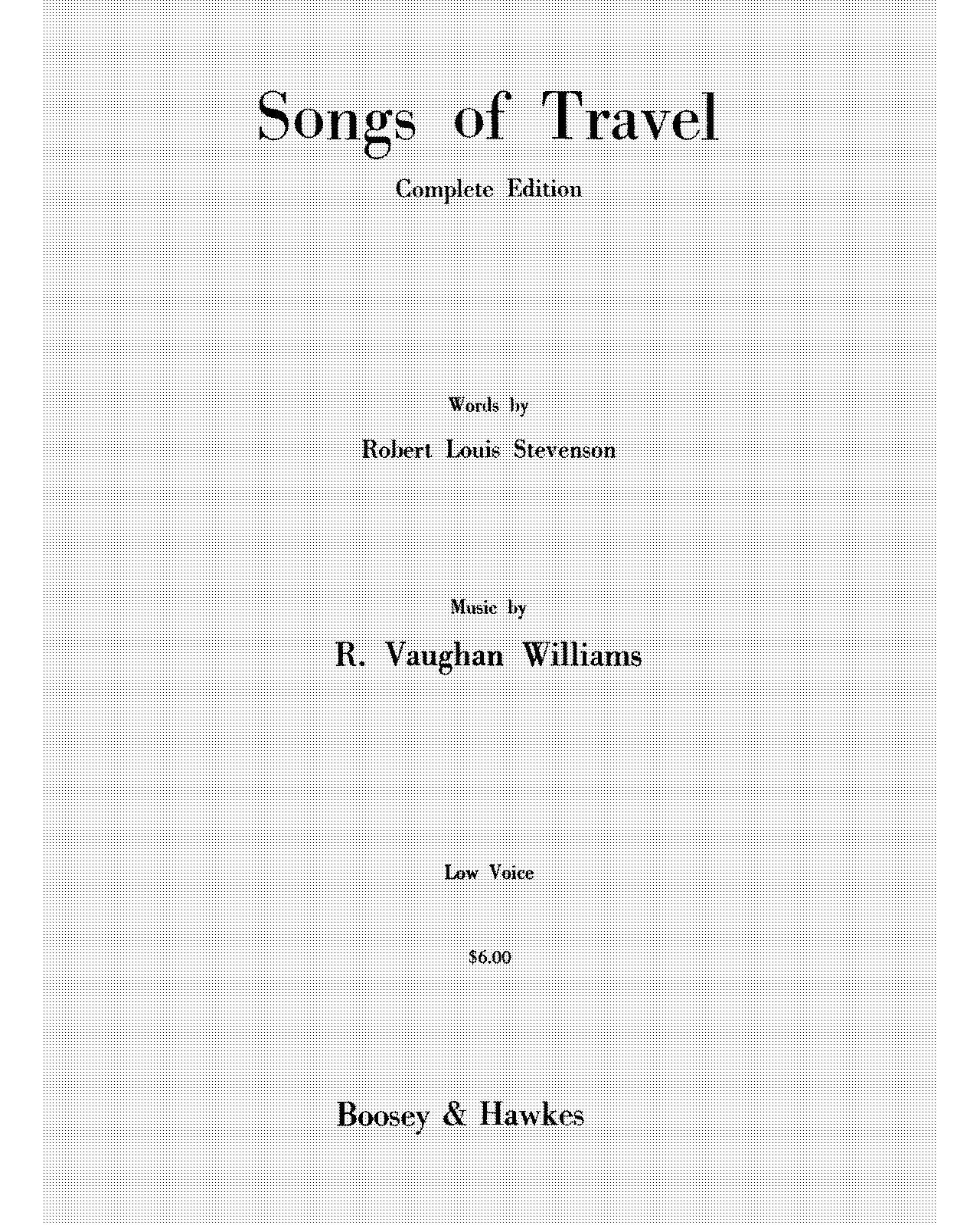
Complete (with posthumous epilogue)
Complete Score (CA) * #834156 - 2.62MB, 39 pp. - 0.0/10 2 4 6 8 10 ( - ) - V / 56 / 29 - Dbmiller
PDF scanned by Unknown Dbmiller ( 2023/1/14 )
Four Songs (Nos.2, 4, 5, 6) * #873636 - 1.87MB, 25 pp. - 0.0/10 2 4 6 8 10 ( - ) - V / V / 29 - 22 × ⇩ - Cypressdome
PDF scanned by Hathitrust Cypressdome (2023/9/6)
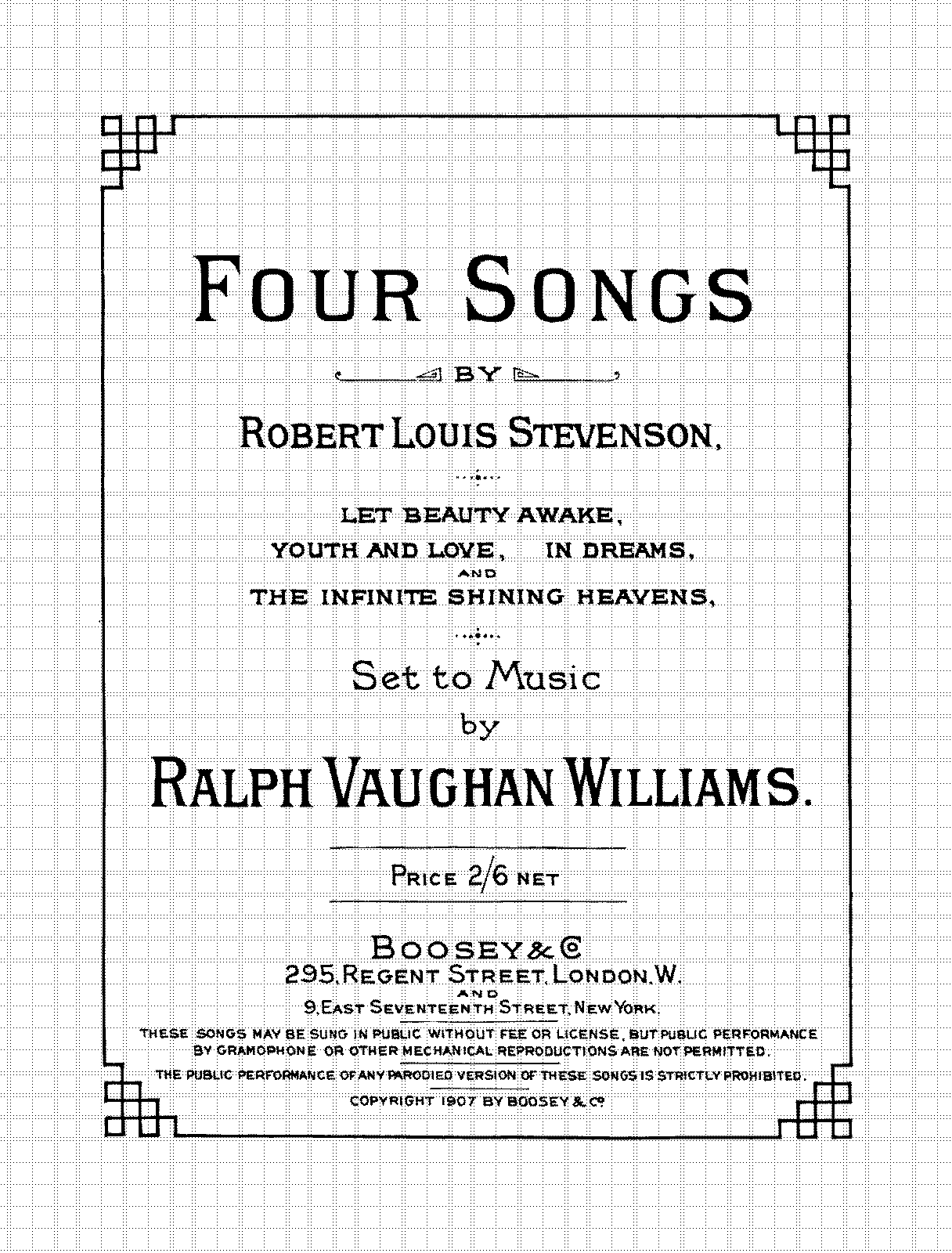
1. The Vagabond * #286189 - 0.10MB, 5 pp. - 0.0/10 2 4 6 8 10 ( - ) - ! N / ! N / 29 - 22919 × ⇩ - PhilHolmes
PDF typeset by editor PhilHolmes ( 2013/6/27 )
2. Let Beauty Awake * #287221 - 0.09MB, 4 pp. - 0.0/10 2 4 6 8 10 ( - ) - ! N / ! N / 29 - 9393 × ⇩ - PhilHolmes
PDF typeset by editor PhilHolmes (2013/7/7)
3. The Roadside Fire * #288044 - 0.11MB, 5 pp. - 0.0/10 2 4 6 8 10 ( - ) - ! N / ! N / 29 - 7896 × ⇩ - PhilHolmes
PDF typeset by editor PhilHolmes (2013/7/13)
4. Youth and Love * #288443 - 0.11MB, 4 pp. - 0.0/10 2 4 6 8 10 ( - ) - ! N / ! N / 29 - 6660 × ⇩ - PhilHolmes
PDF typeset by editor PhilHolmes (2013/7/16)
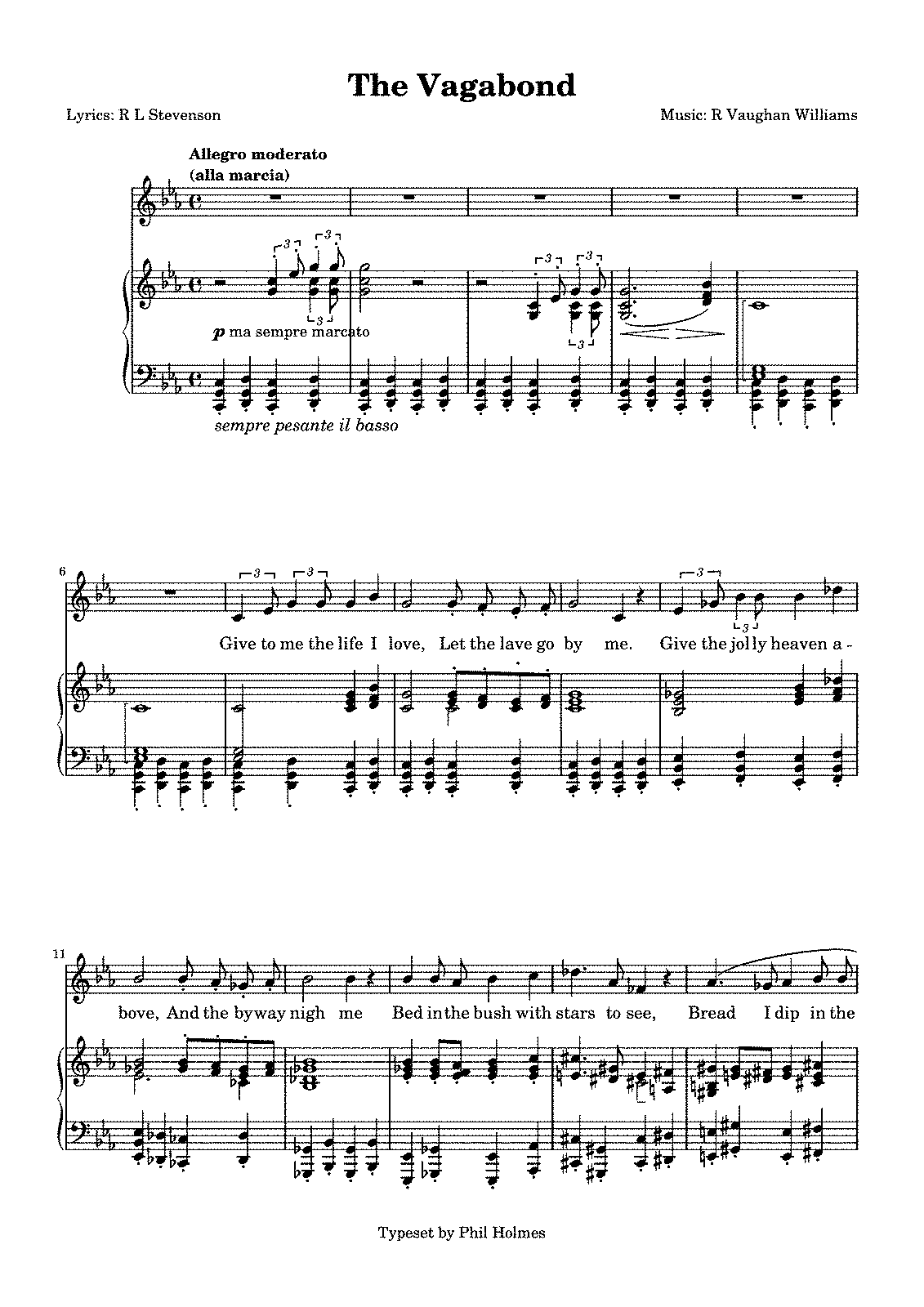
7. Wither Must I Wander (C minor) * #89691 - 0.36MB, 4 pp. - 0.0/10 2 4 6 8 10 ( - ) - V / V / 29 - 3744 × ⇩ - TJ Busse
PDF scanned by TJ Busse TJ Busse ( 2011/1/8 )
7. Whither Must I Wander (C minor) * #439292 - 0.52MB, 9 pp. - 0.0/10 2 4 6 8 10 ( - ) - V / V / 29 - 230 × ⇩ - Zeyarshwe
PDF scanned by Unknown Zeyarshwe (2016/9/15)
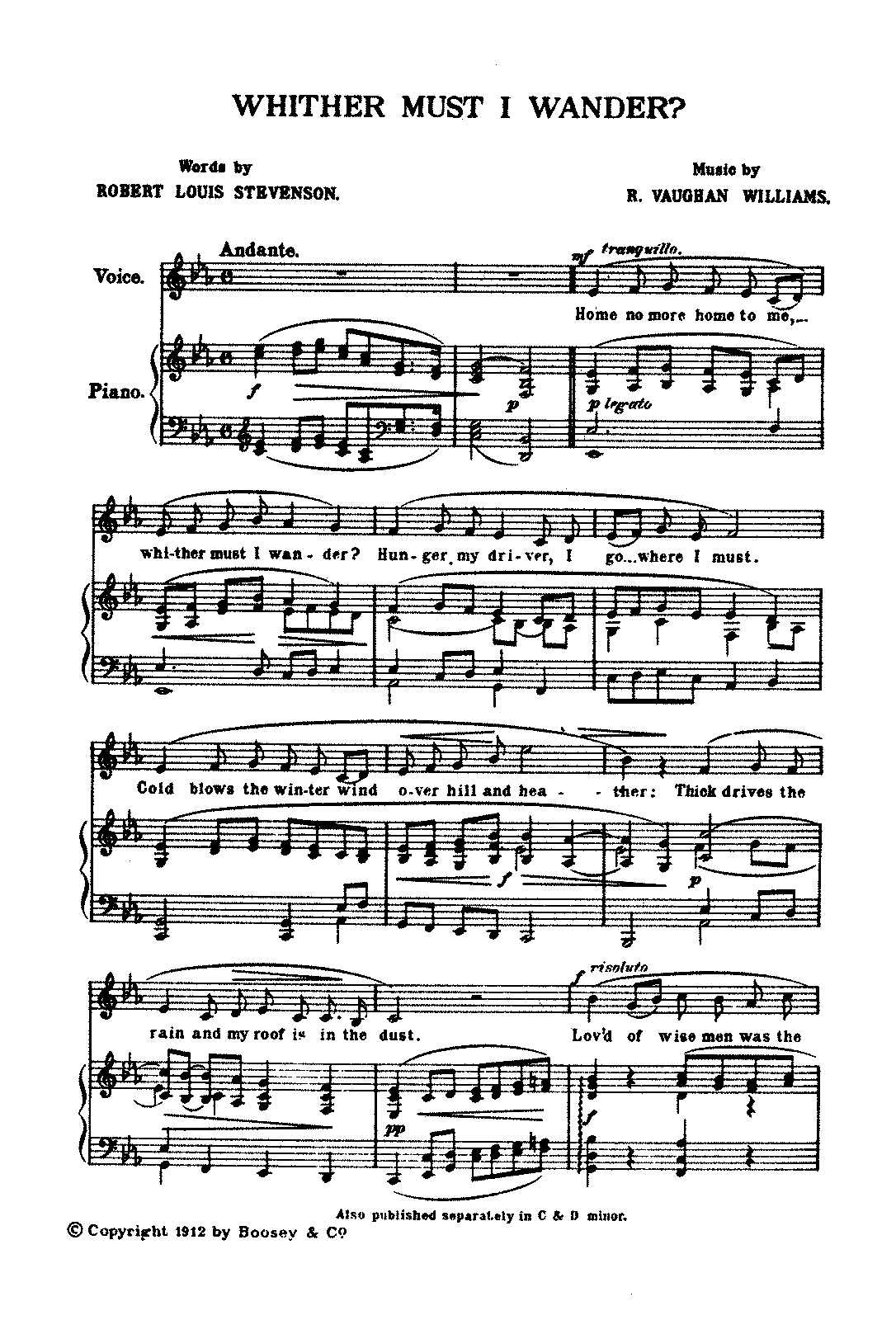
9. I Have Trod the Upward and the Downward Slope (CA) * #538269 - 1.52MB, 2 pp. - 0.0/10 2 4 6 8 10 ( - ) - V / 55 / 29 - Dbmiller
PDF scanned by Dbmiller Dbmiller (2018/8/27)
General Information
- WorkNonPD-EU
- Belov, Anton/Performer
- Brown, Lydia/Performer
- Gardner Museum Recordings
- Pages with First Editions
- Scores published by Boosey & Hawkes
- Scores from HathiTrust
- Vaughan Williams, Ralph
- Early 20th century style
- Early 20th century
- For voice, piano
- For voices with keyboard
- Scores featuring the voice
- Scores featuring the piano
- English language
- Works first published in 1905
- Works first published in the 20th century
- Pages with commercial recordings
- Pages with commercial recordings (Naxos collection)
- Stevenson, Robert Louis/Librettist
Songs of Travel (1904)
By ralph vaughan williams, songs in this series.

Ralph Vaughan Williams
Ralph Vaughan Williams was an English composer. Over sixty years, he composed operas, ballets, chamber music, vocal pieces and orchestral compositions. He was strongly influenced by Tudor music and English folk-song. Information from Wikipedia.…
Performances
Previously performed at:.
- LiedFest Berlin-Oxford 25 Nov 2022
- 26. Ashley Riches, Anna Tilbrook: Vaughan Williams: Perspectives 2 19 Oct 2022
- 104. Christopher Maltman: Songs of Travel 23 Oct 2021
- 08. Songs of Travel: James Platt & Lada Valešová 28 Feb 2021
- Songs of Travel: Benjamin Appl & Simon Lepper 02 Apr 2020
- Songs of Travel: Nicholas Mogg & Jâms Coleman 19 Oct 2018
- James Gilchrist & Anna Tilbrook 03 Mar 2017
Help us with a Donation
Enjoying our texts and translations? Help us continue to offer this service to all.
Make a Donation
Select Tickets
Help us continue our efforts to go ad-free!
LiederNet ran no external ads last month but donations only matched part of our usual ad revenue .
All of our work is done by human beings for human beings, and we have expenses to pay. Please help us continue to share this one-of-a-kind resource with the world.
Songs of Travel
Song cycle by ralph vaughan williams (1872 - 1958), translated to:.
Catalan (Català) — Cançons de viatge (Salvador Pila) Lithuanian (Lietuvių kalba) — Kelionės dainos (Giedrius Prunskus)
1. The vagabond [sung text checked 1 time]
Authorship:
- by Robert Louis Stevenson (1850 - 1894), "The vagabond", subtitle: "To an air of Schubert", appears in Songs of Travel and other verses , no. 1, first published 1896
See other settings of this text.
Available translations, adaptations or excerpts, and transliterations (if applicable):
- CAT Catalan (Català) (Salvador Pila) , copyright © 2016, (re)printed on this website with kind permission
- ITA Italian (Italiano) (Ferdinando Albeggiani) , "Il vagabondo", copyright © 2005, (re)printed on this website with kind permission
- LIT Lithuanian (Lietuvių kalba) (Giedrius Prunskus) , copyright © 2023, (re)printed on this website with kind permission
Confirmed with The Complete Poetry of Robert Louis Stevenson: A Child's Garden of Verses , e-artnow, 2015 (via Google Books).
2. Let Beauty awake [sung text checked 1 time]
- by Robert Louis Stevenson (1850 - 1894), no title, appears in Songs of Travel and other verses , no. 9
Go to the single-text view
- CAT Catalan (Català) (Salvador Pila) , "Que desperti la Bellesa", copyright © 2016, (re)printed on this website with kind permission
- GER German (Deutsch) [singable] (David Paley) , "Die Schönheit erwacht!", copyright © 2011, (re)printed on this website with kind permission
- ITA Italian (Italiano) (Ferdinando Albeggiani) , "Che si desti Bellezza", copyright © 2008, (re)printed on this website with kind permission
- LIT Lithuanian (Lietuvių kalba) (Giedrius Prunskus) , "Lai grožis pabus", copyright © 2023, (re)printed on this website with kind permission
3. The roadside fire [sung text checked 1 time]
- by Robert Louis Stevenson (1850 - 1894), no title, appears in Songs of Travel and other verses , no. 11, first published 1896
- GER German (Deutsch) [singable] (David Paley) , "Romanze", copyright © 2010, (re)printed on this website with kind permission
- ITA Italian (Italiano) (Lucio Forte) , "Farò spille e balocchi per tua delizia", copyright © 2008, (re)printed on this website with kind permission
4. Youth and love [sung text checked 1 time]
- by Robert Louis Stevenson (1850 - 1894), "Youth and Love II", appears in Songs of Travel and other verses , no. 3
- GER German (Deutsch) (Sebastian Viebahn) , "Der Junge und die Liebe", copyright © 2004, (re)printed on this website with kind permission
- ITA Italian (Italiano) (Lucio Forte) , "Gioventù e amore", copyright © 2008, (re)printed on this website with kind permission
5. In dreams [sung text checked 1 time]
- by Robert Louis Stevenson (1850 - 1894), no title, appears in Songs of Travel and other verses , no. 4, first published 1896
- GER German (Deutsch) [singable] (David Paley) , "Im Traum", copyright © 2011, (re)printed on this website with kind permission
- ITA Italian (Italiano) (Ferdinando Albeggiani) , "Nei sogni", copyright © 2008, (re)printed on this website with kind permission
6. The infinite shining heavens [sung text checked 1 time]
- by Robert Louis Stevenson (1850 - 1894), no title, appears in Songs of Travel and other verses , no. 6
- CAT Catalan (Català) (Salvador Pila) , "Els cels infinits i resplendents", copyright © 2016, (re)printed on this website with kind permission
- ITA Italian (Italiano) (Ferdinando Albeggiani) , "I cieli splendenti e infiniti", copyright © 2008, (re)printed on this website with kind permission
- LIT Lithuanian (Lietuvių kalba) (Giedrius Prunskus) , "Spindįs begalinis dangus", copyright © 2023, (re)printed on this website with kind permission
7. Whither must I wander? [sung text checked 1 time]
- by Robert Louis Stevenson (1850 - 1894), no title, appears in Songs of Travel and other verses , no. 16, to the tune of Wandering Willie, first published 1896
- CAT Catalan (Català) (Salvador Pila) , "On haig d’anar?", copyright © 2016, (re)printed on this website with kind permission
- GER German (Deutsch) [singable] (David Paley) , "Wohin muss ich wandern?", copyright © 2010, (re)printed on this website with kind permission
- ITA Italian (Italiano) (Ferdinando Albeggiani) , "Dove mi tocca andare?", copyright © 2008, (re)printed on this website with kind permission
- LIT Lithuanian (Lietuvių kalba) (Giedrius Prunskus) , "Kur turiu keliauti?", copyright © 2023, (re)printed on this website with kind permission
8. Bright is the ring of words [sung text checked 1 time]
- by Robert Louis Stevenson (1850 - 1894), no title, appears in Songs of Travel and other verses , no. 14, first published 1896
- CAT Catalan (Català) (Salvador Pila) , "Lluminós és el ressò de les paraules ", copyright © 2016, (re)printed on this website with kind permission
- HUN Hungarian (Magyar) (Péter Molnár) , "Élénk a szavak zengése", copyright © 2004, (re)printed on this website with kind permission
- ITA Italian (Italiano) (Ferdinando Albeggiani) , "Luminoso è il suono delle parole", copyright © 2008, (re)printed on this website with kind permission
9. I have trod the upward and the downward slope [sung text checked 1 time]
- by Robert Louis Stevenson (1850 - 1894), no title, appears in Songs of Travel and other verses , no. 22
- CAT Catalan (Català) (Salvador Pila) , "He petjat per pendents amunt i avall", copyright © 2016, (re)printed on this website with kind permission
- ITA Italian (Italiano) (Ferdinando Albeggiani) , "A piedi ho percorso salite e discese", copyright © 2008, (re)printed on this website with kind permission
- LIT Lithuanian (Lietuvių kalba) (Giedrius Prunskus) , "Kopiau į kalnus aš ir leidausi žemyn", copyright © 2023, (re)printed on this website with kind permission
We use cookies for internal analytics and to earn much-needed advertising revenue. (Did you know you can help support us by turning off ad-blockers?) To learn more, see our Privacy Policy . To learn how to opt out of cookies, please visit this site .
I acknowledge the use of cookies

IT IS WITH GREAT SADNESS THAT WE ANNOUNCE THE PASSING OF OUR PRESIDENT SIR ANDREW DAVIS CBE. R.I.P.
The First Songs of Travel
The 1954 richard standen / frederick stone recital, this pioneering 1954 westminster lp recital by richard standen (bass-baritone), accompanied by frederick stone (piano), has been remastered for albion records by ronald grames in excellent sound and issued on albcd055. .
This was the first recording of the (then) entire Songs of Travel and includes premiere recordings of five of the songs. We now know the full cycle of nine songs, but only eight of them were published in the composer’s lifetime. The ninth song was not found until after the composer’s death, some four years after this recording was made. Standen’s performance of Songs of Travel was highly regarded by Vaughan Williams.
Richard Standen lived from 1912 to 1987. He appeared on many recital and concert broadcasts on the BBC and soloed in the Bach passions under Vaughan Williams’s baton. He was a popular soloist in choral festivals throughout Great Britain and the European continent during 25 years of active performing, as well as a popular song recitalist. For 20 years he was a well-regarded professor of voice at the Guildhall School of Music and Drama, beginning in 1963.
Frederick Stone is only known today as Kathleen Ferrier’s accompanist on a frequently reissued recital disc, but he had a remarkable 30-year career as a staff accompanist for the BBC and appeared in hundreds of broadcasts with many of the great and near-great performers of his time. This release pays homage to an artist who, sadly now almost forgotten, should be much better known.
Other works by Vaughan Williams in this recital are Silent Noon , The Water Mill – which we know Standen studied with Vaughan Williams – and Linden Lea . Other composers represented (all in the Sea Ballads second half of the recital) are:
Frederick Keel (1871-1954) Michael Head (1900-1976) Charles Villiers Stanford (1852-1924) John Ireland (1879-1962) Albert Mallinson (1870-1946) Malcolm Davidson (1891-1949) Peter Warlock (1894-1930).
In addition to Vaughan Williams, Head and Ireland were still living at the time the recording was made, and the recital included premiere recordings of Keel’s Three Salt-Water Ballads as a cycle, and of Davidson’s A Christmas Carol .

Richard Standen
CRITICAL REVIEWS
Standen and Stone offer direct and unmannered performances that are neat and nimble… As a fine example of recital singing during the 1950’s this is impressive and insightful. Allied to the excellence of the audio restoration and the attractiveness of Albion’s presentation this makes for a wholly enjoyable hour’s music-making regardless of age. For full review click:
Nick Barnard Musicweb International
The accompanying booklet gives the words of the songs, but with Standen, they are never needed. The first section has some of the best of Songs of Travel – The Vagabond, dauntless and sturdy, Bright is the Ring of Words , a joyous celebration of the transformative power of Art, while The Roadside Fire is sunny and exuberant. Standen delivers the melancholy spirit of Whither Must I Wander so movingly. The other Vaughan Williams songs include a delicious performance of Silent Noon , the splendidly graphic narrative of The Water Mill and of course Linden Lea . …
I was truly impressed by the three sea songs by J. Frederick Keel, especially Mother Carey, a mythical threat to all ships. Albert Mallinson’s Four by the Clock and A Christmas Carol by Malcolm Davidson, darker with rich piano accompaniments, were new to me, but really worth hearing.
For full review click:
Alan Cooper British Music Society
…hugely enjoyable, well recorded and has been played more often than reviewing duty required. Warmly recommended.
David Morri s Elgar Society
An absolute must for VW fans as the spirit of the age lives on.
Andrew Palmer Yorkshire Times
(nb. You do not need a Paypal account to purchase)
Postage is fixed at £3 per order – to anywhere in the world – irrespective of the number of CDs in the order.
Contact Information
To contact Officers of the Ralph Vaughan Williams Society please click on the links.
Chairman & Treasurer
Vice Chairman & Secretary
Vice Chairman
Membership Officer
To publicise your concert click here
Publicity & Events Officer (To publicise events, recordings, publications)
Journal Editor (To send us articles)
Information Officer (All matters relating to RVW)
Albion Records (The RVW Society recording label)

© THE RALPH VAUGHAN WILLIAMS SOCIETY | ACKNOWLEDGEMENTS AND COPYRIGHT | LEGAL | PRIVACY
Ralph Vaughan Williams ‘The Vagabond’: A Song of Travel
Published by alex burns on 13th september 2020 13th september 2020, ralph vaughan williams: the vagabond.
Ralph Vaughan Williams’ The Vagabond was originally set for voice and piano and is part of a larger song cycle entitled Songs of Travel. Composed between 1901-1904, this was Vaughan Williams’ first major offering in the world of vocal music. Songs of Travel is a nine part song cycle, with text drawn from the poems of Robert Louis Stevenson’s collection. The song cycle is quintessentially British, and gives a fresh perspective on the Wayfarer Cycle style (E.g Gustav Mahler’s Lieder eines fahrenden Gesellen or Franz Schubert’s Winterreise ).
Although originally written for voice and piano, the Songs of Travel cycle has also been orchestrated for orchestra and voice. Vaughan Williams orchestrated the first, third and eighth songs, and his assistant Roy Douglas orchestrated the remaining songs in the cycle. Although the orchestral versions are still performed in concert halls, the intimacy and raw emotion from the original chamber version is often preferred.
The Vagabond is the first song in the cycle and sets the scene for the traveller. The style that starts off this song cycle is an homage Vaughan Williams’ love of Romanticism that came before. A vagabond is often used to describe someone who travels a lot without a home or job, which sets the scene for this song. The text is taken from Robert Louis Stevenson’s poem of the same name and can be found here:
Give to me the life I love,
Let the lave go by me,
Give the jolly heaven above,
And the byway nigh me.
Bed in the bush with stars to see,
Bread I dip in the river –
There’s the life for a man like me,
There’s the life for ever.
Let the blow fall soon or late,
Let what will be o’er me;
Give the face of earth around,
And the road before me.
Wealth I seek not, hope nor love,
Nor a friend to know me;
All I seek, the heaven above,
And the road below me.
Or let autumn fall on me
Where afield I linger,
Silencing the bird on tree,
Biting the blue finger.
White as meal the frosty field –
Warm the fireside haven –
Not to autumn will I yield,
Not to winter even!
Wealth I ask not, hope nor love,
All I ask, the heaven above,
The heavy opening marching chords highlight the steady and purposeful tread of the traveller as they make their way down the open road. The ascending triplet figure gives some glimmer of hope as the vagabond makes their way through what can only be assumed to be the British countryside. This opening instrumental prelude foreshadows the vocal line a few bars later. The dotted rhythms above the strict march chords below shows the dichotomy between the traveller’s head and his feet. The vocal line is light in style, even with it being originally sung by a baritone voice, and the dainty movement in the ascending phrases is light relief from the heaviness below.
The accompaniment sees the left hand act as the steady bass, changing between tonic and dominant chords for a large proportion of this song. Whereas the right hand moves in unison with the voice, offering harmonic colour to the structure of the song.
Vaughan Williams utilises the words of Stevenson’s poem to accentuate certain rhythms and pitches to create a really picturesque work. Just in the first stanza the line ‘Give the jolly heaven above’ is full of very subtle musical accentuation. Firstly, the bouncy dotted rhythms represent the idea of jolliness perfectly. Secondly, the ascending figure is a great example of word painting, like the traveller is heading to heaven one day, or he is remembering those passed on. These subtle links between the music and the text make The Vagabond a very successful example of nuanced word painting and scene setting.
Furthermore, the line ‘There’s a life for a man like me’ is also an important anchor within this song. This line is proclaimed loud and proud, showing the attitudes of the traveller. He is proud to be a vagabond, and ends this stanza with ‘There is a life forever’ which shows his acceptance of his lifestyle to last forever. The strength heard through the voice on these two lines is replicated throughout the songs on other important ‘story’ lines.
During the third stanza is where the atmosphere begins to change, largely due to a stark change in the accompanying music. The text for this stanza is as follows:
One could assume that the change in atmosphere here is to do with the changing of the season, from summer to autumn, which can bring more tumultuous weather. Vaughan Williams uses more word painting in this section to create different emotions. The second line ‘Where afield I linger’ is important in this section, as the vocalist literally lingers on the word ‘linger’ to create some sort of tension that is threaded through this whole section.
The atmosphere changes again on the line ‘White as the meal the frosty field’, with the colour white representing something pure and perhaps even childlike. The accompaniment plays a delicate flourish of arpeggiated chords, whilst the voice takes the dynamic down and is much more delicate in its approach. The next line starts on the word ‘warm’ and the music reflects this by dropping down an octave in the accompaniment and rumbling up again, like starting a real fire. This whole section builds to a dazzling climax, which is then quickly eradicated in the next section.
The final stanza is a direct repeat of the second stanza of text, however the atmosphere has again been changed. Dissolved to a mere whisper, this final section starts very quietly. The original structure is back with the steady chords from the accompaniment and the dotted triplet movement from the melody and the vocalist. The idea that the traveller is not asking for wealth, hope, love or friends, but instead he just wants to continue with the idea of heaven and the road below him. The penultimate line ‘All I ask, the heaven above’ is proclaimed, like he is actually talking to a higher power above. Then the final line ‘And the road below me’ is back down to a gentle and quiet statement, as he is no doubt closer to the road then the sky and above.
The accompaniment repeats the chords once more, but this time placing them in a manner that is not as steady as before, which perhaps represents the traveller beginning to stop his journey. The Vagabond bears many different readings, from spiritual, to romantic, but it really is up to the listener to figure that out. For me, this work is quintessential in the development of the British song cycle as it lays the foundations for works to come. The rest of the song cycle is all about this traveller and the trials and tribulations of travelling.
Final Thoughts
A lot can be said for the nuanced style of word painting that really gets into the core of what the text is aiming to present to an audience. Vaughan Williams is one of the masters of this, and many of his vocal works are absolutely full of these subtle, but very important musical messages. May his legacy strongly live on.
Ⓒ Alex Burns
Happy Reading!
Image Source
You might also enjoy… Peter Warlock: Sleep
Recommended Recordings:
Axel · 20th January 2023 at 12:05 am
thanks a lot, this helped me really understand this song a wholleee lot better.
Leave a Reply Cancel reply

Your email address will not be published. Required fields are marked *
Related Posts

Joseph Haydn ‘Symphony No.20’: Festive Fun!
Joseph Haydn: Symphony No.20 Context Often known as the ‘Father of the Symphony’, Joseph Haydn’s legacy as a symphonist stays strong today. Haydn composed 104 symphonies over the course of his long and fruitful life, Read more…

Gustav Mahler ‘Symphony No.2’: Movement V
Gustav Mahler: Symphony No.2 (Movement V) Movement V At Mahler’s funeral on 22nd May 1911, fellow composer and friend J.B. Fӧrster recalled that, although Mahler had requested no music to be played at the Read more…
Gustav Mahler ‘Symphony No.2’: Movement IV
Gustav Mahler: Symphony No.2 (Movement IV) Movement IV Although added very late in the compositional process, the fourth movement plays a key role in the dramaturgy of the symphony. After the riotous Scherzo, this movement Read more…
Songs of Travel

Ralph Vaughan Williams (arr. Donald Patterson )
General Info
Year: 1901-4 / Duration: Difficulty: (see Ratings for explanation) Publisher: U.S. Marine Band Cost: Score and Parts - Unknown
1. The Vagabond - 3:00 2. Let Beauty Awake 3. The Roadside Fire 4. Whither Must I Wander - 3:25 5. I Have Trod the Upward and the Downward Slope
Instrumentation
(Needed - please join the WRP if you can help.)
None discovered thus far.
Program Notes
Songs of Travel was among British composer Ralph Vaughan Williams’ first forays into writing songs, and it coincided with a very important time in his compositional career. The songs were composed between 1901 and 1904 when the young Vaughan Williams was beginning to emerge as a unique voice among the luminaries of English classical music. It was the same year he completed this song cycle, in 1904, that he also discovered his passion for the traditional English folk songs that would become a central character in the next fifty years of his compositional life. Although Songs of Travel immediately predates this period, this music is filled with folk-like character. The pairing of Vaughan Williams’ lush and evocative music with the colorful prose of Robert Louis Stevenson brings to life these stories of a weary wanderer in search of something meaningful.
The nine songs in the cycle were originally conceived by Vaughan Williams as a set, but the first eight were released and published separately in two volumes in 1903 and 1905. These first eight songs were performed together in 1904; the final song in the modern edition of the cycle, I Have Trod the Upward and the Downward Slope was clearly composed as an epilogue to the entire narrative of the collection, but was not formally published and performed until 1960, when Vaughan Williams’ widow discovered it among his papers after the composer’s death. All of the songs were originally composed for baritone voice and piano, but Vaughan Williams orchestrated the first, third, and eighth songs almost immediately after their composition. His assistant, Roy Douglas, orchestrated the remaining songs with the same instrumentation several years after Vaughan Williams’ passing.
Marine Band music production chief Master Sergeant Donald Patterson has crafted a transcription of five of the Songs of Travel specifically for the Marine Band. The Vagabond introduces the traveler, with heavy tramping chords depicting a rough journey on the open road and through the English countryside. The vocal line in Let Beauty Awake evokes the images of dawn and dusk with a long and languid melody that floats over soft arpeggios in the accompaniment. The tone shifts in The Roadside Fire, as the traveler delights in envisioning a life and home with a new-found love. Whither Must I Wander is the earliest song composed of the set and shares its character with Vaughan Williams’ most famous song, Linden Lea, which was composed the year before. It is a bittersweet reminiscence of warm memories of home and family, now lost to the traveler’s past and never to return. The epilogue, I Have Trod the Upward and the Downward Slope recounts fragments of several musical themes from the other songs in the cycle as the weary traveler remembers his experiences one final time before he “closes the door.”
- Program Note from U.S. Marine Band concert program, 22 March 2015
State Ratings
Performances.
To submit a performance please join The Wind Repertory Project
- United States Marine Band (Washington, D.C.) (Jason K. Fettig, conductor; Kevin Bennear, baritone)) - 26 August 2021
- United States Marine Band (Washington, D.C.) (Ryan J. Nowlin, conductor; Kevin Bennear, baritone) - 10 March 2017 (82nd Annual ABA National Convention)
Works for Winds by This Composer
Adaptable Music
- Folk Songs from Somerset (Flex instrumentation) (arr. Huckeby) (1924/2020)
- My Bonny Boy (Flex instrumentation) (arr. Huckeby) (1924/2020)
- Seventeen Come Sunday (Flex instrumentation) (arr. Huckeby) (1924/2020)
All Wind Works
- Concerto for Bass Tuba (arr. Wick and Chambers) (1954/1992)
- Concerto Grosso (arr. Grechesky) (1924)
- Concerto in F minor for Tuba and Winds (arr. Hare) (1954/1992)
- England's Pleasant Land (arr. Noble) (1938/2017)
- English Folk Song Suite. See: Folk Song Suite
- English Folk Song Suite (arr. Villanueva) (1924/)
- Fantasia on a Theme by Thomas Tallis (arr. Bocook) (1910/2006)
- Fantasia on Christmas Carols (arr. Laughlin) (1912/2016/2020)
- Fantasia on Christmas Carols (arr. Winkelman) (1912/2013)
- Fantasia on Greensleeves (arr. Wagner) (1934/2011)
- Five English Folk Songs (arr. Feldman) (1913/2009)
- Five Variants of "Dives and Lazarus" (arr. Gregson) (1939/2004)
- Flourish for Glorious John (orch. Boyd) (1957/1998)
- Flourish for Wind Band (1939)
- Folk Song Suite (1924/2008)
- The Golden Vanity (arr. Wagner) (1933/2009)
- I Vow to Thee, My Country (as setter; ed. Grechesky) (1921/1988)
- Lark Ascending, The (tr. Silvester) (1914/1925/2003)
- Linden Lea (arr. Wagner) (1902/2013)
- Linden Lea (arr. Stout) (1902/1984)
- The Lowlands of Scotland (arr. Daehn) (1912/2006)
- March Past of the Kitchen Utensils (arr. Erwin) (1909/2010)
- Norfolk Rhapsody (tr. Robert O'Brien) (1905)
- Norfolk Rhapsody No. 2 in D minor (tr. O'Toole) (1906/2014?)
- The Old Hundredth Psalm Tune (arr. Washburn) (1953/1974)
- Overture to "The Wasps" (tr. Frank Hudson) (1909)
- Prelude, 49th Parallel (arr. van der Beek) (1960/2018)
- Prelude: 49th Parallel (arr. Noble) (1941/2014)
- Prelude: 49th Parallel (arr. Winkler) (1941/1960)
- Prelude from "49th Parallel" (tr. Osmon) (1941/1960/1987/2002)
- Prelude on Three Welsh Hymn Tunes (arr. Curnow) (1954/1982)
- Prelude: The New Commonwealth (arr. Grauer) (1940/2006)
- A Ralph Vaughan Williams Portrait (arr. Wagner) (2018)
- Rhosymedre (tr. Beeler) (1920/1972)
- Rhosymedre (tr. Johnston) (1920/2011)
- Rhosymedre (tr. Baldwin) (1920/)
- The Running Set (arr. Daehn) (1933/2007)
- The Running Set (tr. Silvester) (1933)
- Scherzo alla Marcia (1956)
- Sea Songs (1924)
- Sea Songs (arr. Longfield) (1924/2006)
- Sine Nomine (arr. Cacavas) (1906/1998)
- Sine Nomine (arr. Houseknecht) (1906/1960)
- Sine Nomine (arr. Reed) (1906/1976)
- Songs of Travel (arr. Patterson) (1901-4)
- Three Dorset Songs (arr. Stotter) (1902-1903/2003)
- Three Portraits from England of Elizabeth (arr. O'Bryant) (1955/)
- Three Studies in English Folk Song (arr. Harbinson) (1927/1999/2003)
- Toccata Marziale (1924)
- Toccata Marziale (ed. Battisti) (1924/2005)
- Variations for Wind Band (trans. Hunsberger) (1957/1988/1997)
- A Vaughan Williams Christmas (arr. Wagner) (1999)
- Wassail (arr. Smith)
- Songs of Travel, Wikipedia Accessed 10 March 2017
- Compositions
- Arrangements

- Liberty University
- Jerry Falwell Library
- Special Collections
- < Previous
Home > ETD > Masters > 901
Masters Theses
Songs of travel: an analytical study of ralph williams’ compositional styles.
Jonathan Jacobs Lawton , Liberty University Follow
School of Music
Master of Arts in Music Education (MA)
Mark Greenawalt
English Musical Renaissance, Song Cycle, Text Painting
Disciplines
Music | Music Education
Recommended Citation
Lawton, Jonathan Jacobs, "Songs of Travel: An Analytical Study of Ralph Williams’ Compositional Styles" (2022). Masters Theses . 901. https://digitalcommons.liberty.edu/masters/901
Ralph Vaughan Williams is perhaps one of the most prolific and diverse composers from the British Isles to grace the world with his compositions. He was born in the middle of the English Musical Renaissance, a time of musical rejuvenation of the British Art Song that embraced the principles of the Romantic period and placed significance on the importance of national identity. Ralph Vaughan Williams was the embodiment of musical citizenship – a musical philosophy that leans heavily on national identity for inspiration of word and song. In 1901, a young Ralph Vaughan Williams began writing music for Songs of Travel. Songs of Travel and Other Verses was written as a series of poems by Robert Louis Stevenson, a famous author known for writing well-known works such as Treasure Island and The Strange Case of Dr. Jekyll and Mr. Hyde. During World War I, Ralph Vaughan Williams served his country in the war effort. After his time traveling across Europe as a musician for the British Army, his post-war composition style and focus changed greatly. This change in style stunned his contemporaries because the music he created was vastly different. How did the structure and style of his compositions change after serving in World War I? What other influences contributed to these changes? Through comparison of post-war works with Songs of Travel, what aspects of harmony, melody, and instrumentation demonstrate these developments?
Since August 18, 2022

Included in
Music Education Commons
- Collections
- Faculty Expert Gallery
- Theses and Dissertations
- Conferences and Events
- Open Educational Resources (OER)
- Explore Disciplines
Advanced Search
- Notify me via email or RSS .
Faculty Authors
- Expert Gallery Login
Student Authors
- Undergraduate Submissions
- Graduate Submissions
- Honors Submissions
Home | About | FAQ | My Account | Accessibility Statement
Privacy Copyright
WORLDWIDE shipping
FREE UK delivery over £35
PROUDLY INDEPENDENT since 2001
Vaughan Williams - Songs of Travel
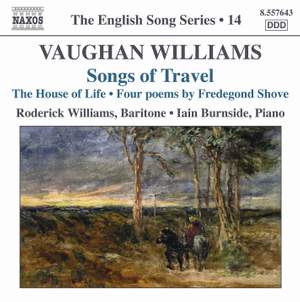
- View full details
- Read reviews
- Listen to samples
The English Song Series Volume 14 - Vaughan Williams 2
Roderick Williams (baritone), Iain Burnside (piano)
Naxos' English Song Series comes up trumps again - here Roderick Williams delivers sensitive performances of the two song-cycles Songs of Travel and The House of Life. An especial highlight... — David Smith, Presto Music, June 2014 More…
- Release Date: 3rd Oct 2005
- Catalogue No: 8557643
- Label: Naxos
- Series: English Song Series
- Length: 66 minutes
Usually despatched in 3 - 4 working days
This release includes a digital booklet
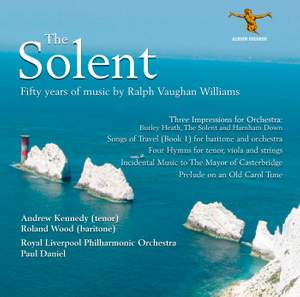
Fifty years of music by Ralph Vaughan Williams
Roland Wood (baritone), Andrew Kennedy (tenor) & Nicholas Bootiman (viola)
Royal Liverpool Philharmonic Orchestra, Paul Daniel
Clearly impressed by the Three Impressions, the RLPO and Paul Daniel perform them excellently, and the other items also. — BBC Music Magazine, December 2013, 4 out of 5 stars More…
- Release Date: 2nd Sep 2013
- Catalogue No: ALBCD016
- Label: Albion Records
- Length: 60 minutes
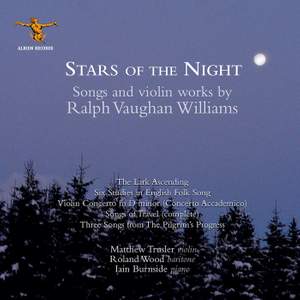
Vaughan Williams: Stars of the Night
Songs and violin works
Matthew Trusler (violin) & Iain Burnside (piano), Roland Wood (baritone) & Iain Burnside (piano)
Wood is a fine musical story-teller, articulating words and melodies with equal sensitivity and care...The melodic architecture emerges clearly in Matthew Trusler's vital performance...Once... — Gramophone Magazine, Awards Issue 2014 More…
- Release Date: 2nd Jun 2014
- Catalogue No: ALBCD018
- Length: 71 minutes
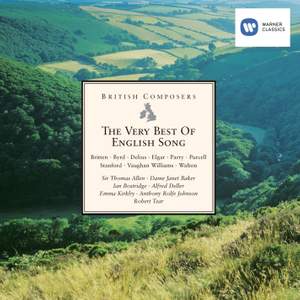
Very Best of English Song
- Release Date: 5th Mar 2012
- Catalogue No: 6805132
- Label: Warner Classics
- Series: British Composers
- Length: 6 hours 24 minutes
No digital booklet included
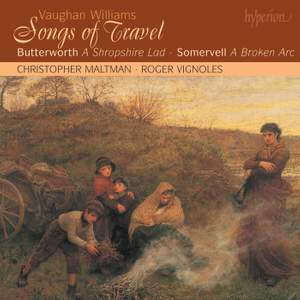
Songs of Travel
Christopher Maltman (baritone), Roger Vignoles (piano)
- Release Date: 7th Sep 2003
- Catalogue No: CDA67378
- Label: Hyperion
- Series: Song Recitals
- Length: 79 minutes
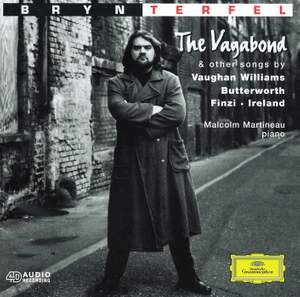
The Vagabond
Bryn Terfel (bass-baritone), Malcolm Martineau (piano)
There's a touch of genius about Bryn Terfel. To those who've known most of these songs since childhood and heard them well performed innumerable times, it will come not quite as a revelation... — Gramophone Classical Music Guide, 2010 More…
- Release Date: 11th Jul 1995
- Catalogue No: 4459462
- Label: Deutsche Grammophon
- Length: 77 minutes
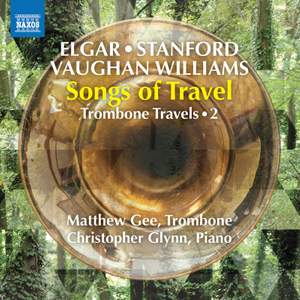
Trombone Travels Vol. 2
Matthew Gee (trombone), Christopher Glynn (piano)
Gee’s arrangements maintain the quality and character of the composers’ original vocal writing. And he plays them with an unfailingly elegant, rich, and beautiful tone and, as his commentary... — Fanfare, September/October 2021 More…
- Release Date: 26th Mar 2021
- Catalogue No: 8579080
- Length: 67 minutes
Usually despatched within 1 working day
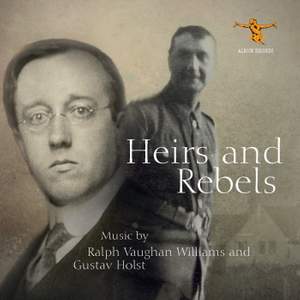
Vaughan Williams & Holst: Heirs and Rebels
Remastered classic 78 rpm recordings
Robert Irwin (baritone), Stuart Robertson (tenor), Edgar Coyle (baritone), Peter Dawson (baritone) & Gerald Moore (piano)
Black Dyke Mills Band, BBC Chorus & Band of HM Grenadier Guards, Rae Jenkins, Leslie Woodgate & Julius Harrison
- Release Date: 27th May 2016
- Catalogue No: ALBCD027
- Length: 65 minutes
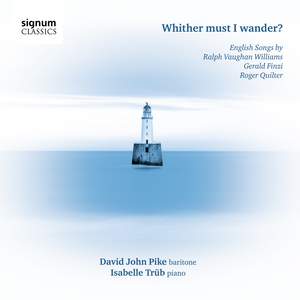
Whither must I Wander?
English Songs by Vaughan Williams, Finzi and Quilter
David John Pike (baritone) & Isabelle Trüb (piano)
a rising young baritone with a powerfully operatic voice. Supported by Isabelle Trüb's acommpaniments, often rather more assertive and colourful than reticent Brits expect, he gives the Songs... — BBC Music Magazine, April 2013, 5 out of 5 stars More…
- Release Date: 3rd Dec 2012
- Catalogue No: SIGCD314
- Label: Signum
- Length: 64 minutes
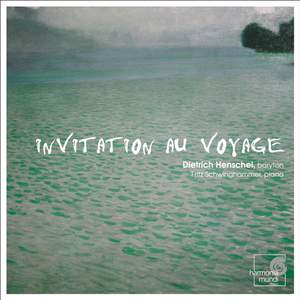
Invitation Au Voyage
Lieder & mélodies on the theme of travel
Dietrich Henschel (baritone) & Fritz Schwinghammer (piano)
In this admirably multi-lingual recital, silk-toned German baritone Henschel and his accompanist performa Vaughan Williams almost as idiomatically as Mahler; only Duparc sounds a little harsh. — BBC Music Magazine, April 2014, 4 out of 5 stars More…
- Release Date: 5th Jun 2006
- Catalogue No: HMC901875
- Label: Harmonia Mundi
- Length: 69 minutes
Download queue
- Clear completed
We will keep fighting for all libraries - stand with us!
Internet Archive Audio

- This Just In
- Grateful Dead
- Old Time Radio
- 78 RPMs and Cylinder Recordings
- Audio Books & Poetry
- Computers, Technology and Science
- Music, Arts & Culture
- News & Public Affairs
- Spirituality & Religion
- Radio News Archive

- Flickr Commons
- Occupy Wall Street Flickr
- NASA Images
- Solar System Collection
- Ames Research Center

- All Software
- Old School Emulation
- MS-DOS Games
- Historical Software
- Classic PC Games
- Software Library
- Kodi Archive and Support File
- Vintage Software
- CD-ROM Software
- CD-ROM Software Library
- Software Sites
- Tucows Software Library
- Shareware CD-ROMs
- Software Capsules Compilation
- CD-ROM Images
- ZX Spectrum
- DOOM Level CD

- Smithsonian Libraries
- FEDLINK (US)
- Lincoln Collection
- American Libraries
- Canadian Libraries
- Universal Library
- Project Gutenberg
- Children's Library
- Biodiversity Heritage Library
- Books by Language
- Additional Collections

- Prelinger Archives
- Democracy Now!
- Occupy Wall Street
- TV NSA Clip Library
- Animation & Cartoons
- Arts & Music
- Computers & Technology
- Cultural & Academic Films
- Ephemeral Films
- Sports Videos
- Videogame Videos
- Youth Media
Search the history of over 866 billion web pages on the Internet.
Mobile Apps
- Wayback Machine (iOS)
- Wayback Machine (Android)
Browser Extensions
Archive-it subscription.
- Explore the Collections
- Build Collections
Save Page Now
Capture a web page as it appears now for use as a trusted citation in the future.
Please enter a valid web address
- Donate Donate icon An illustration of a heart shape
Songs of Travel: Part 2
Bookreader item preview, share or embed this item, flag this item for.
- Graphic Violence
- Explicit Sexual Content
- Hate Speech
- Misinformation/Disinformation
- Marketing/Phishing/Advertising
- Misleading/Inaccurate/Missing Metadata

plus-circle Add Review comment Reviews
1,324 Views
DOWNLOAD OPTIONS
For users with print-disabilities
IN COLLECTIONS
Uploaded by Amy McCrory on June 17, 2010
SIMILAR ITEMS (based on metadata)
- Browse Products Piano Songbooks and Sheet Music Guitar, Bass and Folk Instruments Educational Piano Vocal Choral and Classroom Church Music Band, Jazz and Orchestra Solo Instrumental Drums and Percussion Classical Trade and Reference Books Distributed Tech Distributed Instruments/Gear/Gifts Featured Series Play-Along Series Hal Leonard Methods
- About Us Our Story Our Mission Press Releases Jobs Calendar Stay Connected Digital Partners Publisher List M.I. Distribution
- Dealer Access
- Digital Books
Songs of Travel Voice and Orchestra Boosey & Hawkes Scores/Books Softcover

- Series: Boosey & Hawkes Scores/Books
- Publisher: Boosey & Hawkes
- Format: Softcover
- Study Score
- Composer: Ralph Vaughan Williams
- Price: $55.00 (US)
First publication of the orchestral cycle Songs of Travel , setting poems of Robert Louis Stevenson. Three of the nine orchestrations are by the composer, dating from 1905; the remainder were scored by his assistant Roy Douglas in 1960, two years after the composer's death. Among the latter was the hitherto lost epilogue “I have trod the upward and the downward path.” In his memoir Working with Vaughan Williams Douglas wondered: “Should I score them in my own style (the answer was clearly no), in the style of the orchestrations he had made in 1905, or in the way he might have scored them in 1958 (which would have been vastly different)? The final result was a typically British compromise, but I took care to use in my scoring only those instruments which he had used in 1905.”
Instrumentation
Product details.
- Inventory: #HL 48024548
- ISBN: 9781784542665
- UPC: 888680916688
- Publisher Code: M060133060
- Width: 7.25"
- Length: 10.0"
- Run Time: 0:23:00
- Page Count: 86 Pages
Prices and availability subject to change without notice.
Also Recommended:

Customers Who Purchased This Item Also Purchased:

Songs of Travel has been added to your cart
You Might Also Like:
Due to high demand, Songs of Travel is on back order
Purchase Now and we will ship this item when it is available.
Our privacy policy has recently been updated. By clicking Accept or "X" , you hereby accept and agree to the updated privacy policy .
Unable to add to Wish List
Toggle sidebar, for fast, easy shipping in the eu, please visit musicroom.com, we're sorry.
Hyperion Records
Welcome to Hyperion Records, an independent British classical label devoted to presenting high-quality recordings of music of all styles and from all periods from the twelfth century to the twenty-first.
Hyperion offers both CDs, and downloads in a number of formats. The site is also available in several languages.
Please use the dropdown buttons to set your preferred options, or use the checkbox to accept the defaults.

Songs of travel
Christopher maltman (baritone) , roger vignoles (piano), other recordings available for download, introduction.
The Songs of travel made a strong impression on audiences and musicians of the time; for instance, Arthur Bliss, nineteen years Vaughan Williams’s junior, who studied at Cambridge between 1910 and 1913, recalled in his autobiography As I Remember : ‘To us musicians in Cambridge Vaughan Williams was the magical name; his Songs of travel were on all pianos’. In the context of the development of English song they are important too, for they reflect a significant advance from the parlour song to the art song which professional singers—such as the cycle’s dedicatee, the bass-baritone Plunket Greene—were encouraging composers to write. Here, like the Somervell cycles, was a work conceived in the tradition of the early Romantic questing song cycle of love and loss. Nevertheless, it differs from its models and from Somervell’s works in that there is no real narrative thread from one poem to the next, rather a set of different circumstances on which the poet comments. Significant too is the influence of folksong on several of the songs. Vaughan Williams collected his first folksong, ‘Bushes and Briars’, in December 1903 and the experience of finding the lovely traditional tunes is apparent in Songs of travel .
The opening song ‘The vagabond’ establishes the cycle’s Romantic credentials; indeed Stevenson had composed the words ‘To an air of Schubert’. Its steady tramping accompaniment, combined with a triplet which prefigures the opening of the vocal line, evokes the purposeful tread of the wanderer striding out on the open road. ‘Let Beauty awake’, with its images of dawn and dusk, has a fervent melodic line that floats on a buoyant arpeggio accompaniment. Particularly memorable is the bitter-sweet radiance of the phrase ‘And the stars are bright in the west!’, which recurs as a link between the verses and in the brief coda. Over a joyous accompaniment, ‘The roadside fire’ radiates the delight of new-found love that bubbles over ecstatically in the final verse. ‘Youth and love’ is the kernel of the cycle and points to its central dilemma: which is preferable, ‘love’ and by implication a settled life, or ‘solitude’ and the freedom to wander. As if emphasising the choice to be made, the accompaniment includes transformed allusions to the triplet figure from ‘The vagabond’ and the opening phrase of ‘The roadside fire’ at the song’s climax. ‘In dreams’ has a chill melancholy, created through a persistent, uneasy off-beat rhythm in the piano and a brooding chromatic vocal line. Pianissimo, wide-spaced arppegiated piano chords, combined with an expansive melodic line evoke the vast brilliance of the night sky in ‘The infinite shining heavens’, in which the traveller, gazing above, finds peace. ‘Whither must I wander?’ has a homely simplicity, appropriate to the poet’s images of childhood and the security of home and family which are now long in the past, never to return. In its character it is close to Vaughan Williams’s most renowned song ‘Linden Lea’, composed the year before it. A sole sonorous chord, like a call to attention, opens ‘Bright is the ring of words’, whose forthright melody incorporates the opening notes of the hymn ‘Sine nomine’ (‘For all the Saints’), which haunted the composer throughout his life. The brief epilogue, with its references to ‘The vagabond’, ‘Whither must I wander?’ and ‘Bright is the ring of words’, encapsulates the whole cycle with the wanderer, now old, looking ahead to his final journey beyond the grave.
from notes by Andrew Burn © 2003
Other albums featuring this work
[Return to top of page]
Songs of Travel 9+
An interactive graphic novel, causa creations interactive media gmbh, designed for ipad, screenshots, description.
An animated graphic novel exploring the unique stories of five migrants. An animated graphic novel exploring the unique stories of five migrants seeking new beginnings in Europe. Together, these stories paint a mosaic of themes such as our hopes, dreams, and identities and the things we treasure most. The aim of Songs of Travel is to bring the personal stories of migrants to a wider audience and paint a vivid picture of the topic of migration. The narratives are tied together by the experiences of the Syrian artist Jack Gutmann, who co-developed the award-winning game "Path Out" with the game’s developer, Causa Creations. These tales are set to the backdrop of a specially curated soundtrack by Northern Irish composer Elaine Agnew. The use of this music is a vital element of the project, which will be presented in the four partnering festivals in Ireland (Cellissimo), Sweden (Fairplay Chamber music), Norway (Valdres Sommersymfoni) in 2024, and in the Netherlands (Piano Biennale) in 2025. Follow the narratives of: * Light, a non-binary Syrian refugee who arrives in Vienna after years of hardship and war in Syria and the United Arab Emirates. * Vân, the daughter of a Vietnamese contract worker who grew up in East-Germany and who must deal with the duality of being Vietnamese-German. * Michele, the son of Francesco Cicora, an Italian coal miner who died in the great mining disaster of Marcinelle 1956 in Belgium. * Hasan, who came to Austria at the age of 1, when his mother moved there from Istanbul, Turkey. * Olya, a Ukrainian lawyer and a refugee who has had to flee twice: first when she left her home of Donetsk in 2014 and fled to Kyiv, and then when she fled from Ukraine once war erupted in 2022.
App Privacy
The developer, Causa Creations Interactive Media GmbH , indicated that the app’s privacy practices may include handling of data as described below. For more information, see the developer’s privacy policy .
Data Not Collected
The developer does not collect any data from this app.
Privacy practices may vary, for example, based on the features you use or your age. Learn More
Information
- Developer Website
- App Support
- Privacy Policy
More By This Developer
Die Andere Stadt
Mein erstes Spurenbuch
- Share full article

Classical musicians have limited options to play professionally, so some turn to the U.S. military.
Those who emerge successfully from the audition process must then endure boot camp.
For several months, musicians train as soldiers without any access to their instruments.
Managing to secure a full-time job with a premier military band can be transformational.
Supported by
She Landed One of Music’s Great Gigs, but First Came Boot Camp
Premier military bands offer rare stability for classical musicians, who consider them a strong alternative to traditional orchestras. But signing up means shipping out.
By Sarah Diamond
Photographs by Christopher Lee
Sarah Diamond and Christopher Lee followed a military band audition in West Point, N.Y.; several days of basic training at Fort Leonard Wood, Mo.; and a concert in North Salem, N.Y.
The 4,300-seat performance space about an hour north of Carnegie Hall was eerily empty, except for nine judges in uniform sitting behind a thick black curtain.
Ada Brooks, her mouth dry from nerves, lifted the bell of her euphonium, a smaller relative of the tuba, and prepared to play the notes that could determine her future.
“Breathe,” she thought. “The beginnings are the most treacherous part.”
Ms. Brooks had told herself this before. Her fervent pursuit to professionally play the euphonium, which is not used in traditional symphony orchestras, had come with many stressful auditions. This one was her 10th for the institution that calls itself the nation’s largest employer of musicians: the United States military.
Time and time again she had practiced and prepared and tried to remember to breathe. She was turned down repeatedly or offered jobs in regional bands. Now came an opportunity for a premium position, a rarely open seat in the prestigious West Point Band.
Some aspects of the audition — like playing for a jury hidden behind a curtain, to guard against potential bias — would be familiar to most orchestra musicians. Others were unique to the military. Two of the other four candidates said they had to lose weight to qualify, and the finalists were tested for coordination in marching drills.
Scores of regional military bands represent the armed forces at ceremonies, parades and holiday celebrations. About a dozen premier bands, including the U.S. Military Academy’s ensemble in West Point, N.Y., perform at inaugurations and foreign dignitary visits.

Seats in the premier bands are particularly attractive, providing job security and steady pay — the starting salary is about $70,000 — along with health care and other benefits. Those who win them tend to stay for many years, if not their entire careers.
Ms. Brooks had been practicing three hours a day in Denton, Texas, using high-end recording equipment in her living room to identify imperfections in her pitch or tempo.
At the audition, she was confident and precise while playing excerpts from works by Schoenberg, Ralph Vaughan Williams and Shostakovich, as well as from the soundtrack of “Raiders of the Lost Ark” by John Williams.
At one point, a judge asked if she could “be more declamatory.” She repeated a few measures. After she played Boismortier’s Sonata No. 12 with the band’s principal euphonium player, Staff Sgt. Christopher Leslie, one of the judges barked: “I think you can do a better job matching his style and intonation. One more time.”
Boismortier’s Sonata No. 12
In the end, Ms. Brooks was one of two finalists asked to play additional excerpts and to sit for a face-to-face interview with the judges. The final question came from the band’s conductor, Lt. Col. Daniel Toven: Why is your dream to be in a premier military band?
Ms. Brooks paused.
“As you probably know,” she said, “euphoniums don’t have a lot of options.”
There was a burst of laughter.
After careful deliberation, Sergeant Leslie delivered the verdict. She was in.
Well, almost. Ms. Brooks had to complete more than two months of boot camp before she would become an Army musician.
A Music Mission
Ms. Brooks, 27, was introduced to the euphonium by her eighth-grade band teacher in Columbia Falls, Mont. At the time she thought it “was just a less cool tuba,” as she put it, and nobody was concerned about the limited career opportunities.
By 10th grade, she had made the all-state band and was no longer planning to study math, science or physics in college. She was now determined to play the euphonium professionally.
She spent $7,000 on a euphonium and two years at Interlochen, a performing arts high school in Michigan. Ms. Brooks then earned bachelor’s and master’s degrees in music performance at the University of North Texas, where she made an eight-year commitment to the Air National Guard Band of the Southwest, eager for part-time experience playing music in a military setting.
When Ms. Brooks’s unit was deployed unexpectedly to the border of Texas and Mexico as part of Operation Lone Star , many of the musicians quit. “Our band shrunk to half of its original size,” she said.
During her 10-month deployment, Ms. Brooks worked from midnight to 8 a.m. in the armory issuing weapons. Many of her bandmates provided water to crossing migrants and sat with them until Border Patrol agents arrived. She lived in a hotel, which made it hard to prepare for auditions.
“I was practicing my instrument out in my car,” she said. “It was really miserable.”
Military life can be a shock to musicians, most of whom have no prior experience with the armed forces.
“We have to wear a combat uniform to play the tuba, it’s a little weird,” said Staff Sgt. Alec Mawrence, a tuba player in the West Point Band. “Eventually, your head is shaved and you’re screaming, ‘Yes, drill sergeant.’”
Rifles, Not Instruments
The sun had not yet risen over the Ozark Mountains in south central Missouri, but the trainees in Company B, 3rd Battalion, 10th Infantry Regiment were already marching. It was early January and cold — 1 degree — and tendrils of mist hung over the unit.
“I left my home to join the Army,” the trainees sang in unison.
“I Left My Home to Join the Army”
Ms. Brooks — now Specialist Brooks — had thought the daunting experience would be well worth it, saying earlier that “basic training is no big deal compared to 20 years of a performance job.”
But now, after six weeks at Fort Leonard Wood and with five more to go, Specialist Brooks looked exhausted. She liked morning bugle call and rifle training, especially the precision, which reminded her of practicing her instrument. Less enjoyable was standing for hours in the cold and eating abnormally fast.
“While I’m here, I practice my jodies, my marksmanship,” she said, referring to the call-and-response cadences sung while marching or running. She could not bring along her euphonium, and tried not to think about it. “It feels like a whole different life,” she said. Most of the trainees were unaware she was a musician.
A quiet perfectionist, Specialist Brooks had a hard time with the barrage of reprimands that are the hallmark of basic training. Her coping mechanism was to smile, prompting the drill sergeants to snap, “Brooks, hide your teeth!”
“I wasn’t sure how I would handle getting yelled at,” she said. “But then you realize that they’re not actually angry. They just do that all the time.”
When the company reached the armory to pick up rifles for range training, the shivering trainees stood at attention. “Soldier’s creed!” a drill sergeant shouted.
“I am an American soldier,” Specialist Brooks responded, with her unit. “I stand ready to deploy, engage, and destroy the enemies of the United States of America in close combat.”
Music and the military have long been intertwined. For centuries, drums have been used to set the pace of marches. Fifes and drums were used to communicate on the battlefield before radios. The country’s first military band — the United States Marine Band , known as “the President’s Own” — was formed by an act of Congress in 1798.
Loras John Schissel, a senior musicologist at the Library of Congress, said that during the Civil War, band members would put down their instruments, take up their weapons and fight — and then resume playing. By the early 20th century, music was considered important for military morale.
“Music,” he said, came only “after food, water and ammunition.”
Direct exposure to combat has become increasingly rare for military musicians, but it is not unheard-of. In 1941, all 21 musicians aboard the battleship Arizona died in the attack on Pearl Harbor while passing ammunition to the ship’s guns. On Sept. 11, 2001, the U.S. Army Band helped with search and rescue at the Pentagon.
Quiet Confidence
The possibility of battle is one reason musicians get the same training as infantry soldiers. So on another freezing morning during basic training, Specialist Brooks and 136 other soldiers prepared to rappel down a 40-foot-high wooden structure known as the Confidence Tower.
During a mostly silent 1.5-mile march to the tower — talking was prohibited — the loudest noises were the crunch of frost beneath boots and the swish of camo fatigues against heavy packs.
Cut off from music in boot camp, Specialist Brooks would hum Gustav Holst’s First Suite in E-flat while running laps. Before she arrived, she transcribed song lyrics, including “Dog Days Are Over” by Florence + The Machine, into her notebook so that she would have a radio in her head. While packing for a field exercise, she and her roommates sang the show tune “It’s the Hard-Knock Life.”
On the march to the Confidence Tower, a cadence Specialist Brooks had been required to yell many times was stuck in her head.
Sitting in my foxhole sharpening my knife out pops the enemy had to take his life die kill ’em die kill ’em Why won’t you die?
“I like the singing part, but the violence is a little shocking to me,” she said later.
By the time the trainees reached the tower, two had been disqualified for marching too slowly. Several others could not complete the small training wall nearby. Specialist Brooks, a rock climber and caver, was unfazed.
The wind shook the tower, and the wood creaked. As Specialist Brooks reached the top, one drill sergeant sitting near the drop-off called out to another: “You take Esophagus.” It was an affectionate nickname the instructors had given her, a play on “euphonium.”
Specialist Brooks knelt by the edge at the top of the tower. Unconcerned about hiding her teeth, she broke into a grin.
Throughout basic training, she tried not to dwell on what she was missing most from her home near Dallas: Baking her favorite blueberry muffins with chia seeds. Lingering over a cup of coffee. Watching a movie on the couch with her dog and her three cats, Kiwi, Biscuit and Momo.
When it was time for Specialist Brooks to leave Fort Leonard Wood, her boyfriend arrived with her euphonium. She played a solo even before eating her first meal off the base.
‘Tax Dollars at Work’
In April, two months after she finished boot camp, Sergeant Brooks, who was promoted to staff sergeant after graduation, was at a school in North Salem, N.Y., for her first concert as a member of the West Point Band. She had rehearsed with the group twice and was now nervously adjusting the ornate pin on the lapel of her black blazer.
“Does this look straight?” she asked. Glancing at her full concert uniform in a mirror, she said, “It’s exciting and weird to see yourself dressed like this.”
The repertoire for the concert was chosen to trace West Point’s legacy. By the time the band reached “Boogie Woogie Bugle Boy,” the crowd was cheering and singing along.
The conductor, Colonel Toven, wrote in his master’s thesis that music helped the Army accomplish its public affairs mission of engendering trust and confidence among citizens. “These are your tax dollars at work,” he said proudly during a mid-concert speech.
After “The Official West Point March” and a rousing encore of John Philip Sousa’s “The Stars and Stripes Forever,” Sergeant Brooks’s first concert with the band was over. She looked elated and relieved.
“The Official West Point March”
As the musicians mingled with enthusiastic audience members, Sergeant Leslie found Sergeant Brooks. “Congratulations,” he said, with a collegial nod that was far from his neutral facade as a judge at her audition eight months earlier. Sergeant Brooks, holding a bouquet of flowers, beamed.
She clutched at her collar and asked a bandmate, “Is anyone else warm in these uniforms?” As her adrenaline began to fade, she said that playing alongside these military musicians felt surreal: “It’ll take a while to get over the impostor syndrome.”
Sarah Diamond is a Times audio producer, based in New York. She also writes a biweekly column, Word Through The Times . More about Sarah Diamond
Advertisement

IMAGES
VIDEO
COMMENTS
Songs of Travel is a song cycle of nine songs originally written for baritone voice composed by Ralph Vaughan Williams, with poems drawn from the Robert Louis Stevenson collection Songs of Travel and Other Verses.A complete performance of the entire cycle lasts between 20 and 24 minutes. They were originally written for voice and piano. Vaughan Williams orchestrated the first, third, and ...
Vaughan Williams - Songs of Travel00:00 1. The Vagabond 03:12 2. Let Beauty Awake05:15 3. The Roadside Fire07:40 4. Youth and Love11:16 5. In Dreams13:50 6. ...
The Lied, Art Song, and Choral Texts Archive. Extra Information. *No.9. "I have Trod the Upward and the Downward Slope" published posthumously in 1960 and should be sung only if the entire cycle is being performed. Vaughan Williams orchestrated the first, third, and eighth songs, and his assistant Roy Douglas later orchestrated the remaining ...
I have trod the upward and the downward slope Lyrics. Producers Ralph Vaughan Williams & Robert Louis Stevenson. Writers Ralph Vaughan Williams & Robert Louis Stevenson. Home. R. Ralph Vaughan ...
26. Ashley Riches, Anna Tilbrook: Vaughan Williams: Perspectives 2 19 Oct 2022; 104. Christopher Maltman: Songs of Travel 23 Oct 2021; 08. Songs of Travel: James Platt & Lada Valešová 28 Feb 2021; Songs of Travel: Benjamin Appl & Simon Lepper 02 Apr 2020; Songs of Travel: Nicholas Mogg & Jâms Coleman 19 Oct 2018; James Gilchrist & Anna ...
Language: English. Give to me the life I love, Let the lave go by me, Give the jolly heaven above And the byway nigh me. Bed in the bush with stars to see, Bread I dip in the river - There's the life for a man like me, There's the life for ever. Let the blow fall soon or late, Let what will be o'er me; Give the face of earth around And the road ...
Provided to YouTube by Universal Music GroupVaughan Williams: Songs of Travel - I. The Vagabond · Bryn Terfel · Malcolm MartineauBryn Terfel - The Vagabond℗ ...
Ralph Vaughan Williams: Songs of Travel for Voice and Piano ( 1901, 1904) I. VagabondRecorded live in Alice Tully Hall on October 30, 2016.Video produced by ...
The accompanying booklet gives the words of the songs, but with Standen, they are never needed. The first section has some of the best of Songs of Travel - The Vagabond, dauntless and sturdy, Bright is the Ring of Words, a joyous celebration of the transformative power of Art, while The Roadside Fire is sunny and exuberant.Standen delivers the melancholy spirit of Whither Must I Wander so ...
Songs of Travel by Ralph Vaughan Williams. Publication date 1905 Usage Public Domain Mark 1.0 Topics music Publisher Boosey & Hawkes Collection PublicJukebox Contributor Public Resource Language English. Notes. From the collection of Martin R. Lucas and Corinne Becknell Lucas. Addeddate 2022-12-22 17:35:01
Ralph Vaughan Williams' The Vagabond was originally set for voice and piano and is part of a larger song cycle entitled Songs of Travel. Composed between 1901-1904, this was Vaughan Williams' first major offering in the world of vocal music. Songs of Travel is a nine part song cycle
Songs of Travel was among British composer Ralph Vaughan Williams' first forays into writing songs, and it coincided with a very important time in his compositional career. The songs were composed between 1901 and 1904 when the young Vaughan Williams was beginning to emerge as a unique voice among the luminaries of English classical music.
To begin with two observations: (1) of the nine songs that eventually came to comprise Vaughan Williams's Songs of Travel, two - Nos 4 ('Youth and Love') and 9 ('I Have Trod the Upward and the Downward Slope') - quote material from earlier songs; and (2) in an article published in 1897, Vaughan Williams criticized some of his predecessors for lacking a 'nice sense of proportion ...
September 9, 2022 by Hank Reynolds. Vaughan Williams, Songs of Travel. Ralph Vaughan Williams (1872-1958) composed Songs of Travel early in his career. The cycle of nine songs is taken from a collection of 46 poems by Robert Louis Stevenson. Baritone Roderick Williams presents six of the songs in this video. Leypold, Wanderer in the Storm (1835)
In 1901, a young Ralph Vaughan Williams began writing music for Songs of Travel. Songs of Travel and Other Verses was written as a series of poems by Robert Louis Stevenson, a famous author known for writing well-known works such as Treasure Island and The Strange Case of Dr. Jekyll and Mr. Hyde. During World War I, Ralph Vaughan Williams ...
Ralph Vaughan Williams (1872-1958) Songs of Travels (Chants du voyage) Poems by Robert Louis Stevenson.00:00 I. "The Vagabond"03:09 II. "Let Beauty Awake"04:...
Vaughan Williams & Holst: Heirs and Rebels. Remastered classic 78 rpm recordings. Robert Irwin (baritone), Stuart Robertson (tenor), Edgar Coyle (baritone), Peter Dawson (baritone) & Gerald Moore (piano) Black Dyke Mills Band, BBC Chorus & Band of HM Grenadier Guards, Rae Jenkins, Leslie Woodgate & Julius Harrison. Release Date: 27th May 2016.
Songs of Travel: Part 2 Bookreader Item Preview ... Songs of Travel: Part 2 by Vaughan Williams, Ralph. Publication date 1907 Usage Public Domain Topics Robert Louis Stevenson (1850-1894)--Musical settings, Songs (Medium voice) with piano Publisher London; New York: Boosey & Hawkes
Composer: Ralph Vaughan Williams; Price: 55.00 (US) First publication of the orchestral cycle Songs of Travel, setting poems of Robert Louis Stevenson. Three of the nine orchestrations are by the composer, dating from 1905; the remainder were scored by his assistant Roy Douglas in 1960, two years after the composer's death.
Bryn Terfel sings Ralph Vaughan Williams' "The Roadside Fire" from his song cycle, "Songs of Travel"
Vaughan Williams's Songs of travel cycle belongs to the first decade of the last century when his personal voice was emerging and the work marks a major achievement in his development. The poems are by Robert Louis Stevenson, and the songs were originally performed in a group of eight by Walter Creighton and Hamilton Harty at the Bechstein Hall, London, on 2 December 1904.
An animated graphic novel exploring the unique stories of five migrants seeking new beginnings in Europe. Together, these stories paint a mosaic of themes such as our hopes, dreams, and identities and the things we treasure most. The aim of Songs of Travel is to bring the personal stories of migrants to a wider audience and paint a vivid ...
Orchestrated by the composer (No. 1, 3, 8) and Roy Douglas (No. 2, 4, 5, 6, 7, 9)Text by Robert Louis StevensonScore: https://www.boosey.com/cr/perusals/scor...
Sergeant Brooks was introduced to the euphonium in eighth grade and has played it for half her life. In April, two months after she finished boot camp, Sergeant Brooks, who was promoted to staff ...
De gevierde Britse bariton Roderick Williams - Baritone en pianist Daan Boertien nemen je in deze Empty Concertgebouw Sessions mee op reis met 'Songs of Trav...